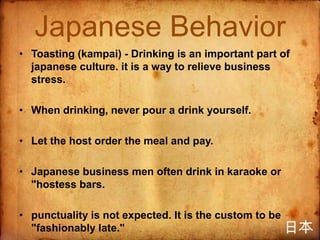
Joru
- 1. Japanese Behavior • Toasting (kampai) - Drinking is an important part of japanese culture. it is a way to relieve business stress. • When drinking, never pour a drink yourself. • Let the host order the meal and pay. • Japanese business men often drink in karaoke or "hostess bars. • punctuality is not expected. It is the custom to be "fashionably late."
- 2. • always say "itadakimasu" at the beginning of a meal, and "gochisou-sama-deshita" at the end. • It is perfectly acceptable to slurp your noodles. Doing so will exhibit your enjoyment of your food. • Do not openly display money. It is important to use an envelope to pass money. • Tipping is not expected. • Gift giving is very important both business and personal gifts.
- 3. • Always wrap gifts. • Do not give gifts in odd number or the number four. • Gifts should be given at the end of a visit. • The most popular gift giving occasions in Japan are oseibo, which falls at the end of the year and O- chugen which falls during the middle of the year.
- 4. Japenese Personality • Happiness in Japan- , 88 percent of the Japanese said they were happy. Only 10 percent said they were unhappy.' • Losing Face - The Japanese like many Asians are very conscious of face. Face is essentially respect in a community and is a crucial underpinning of society. • Morality and Logic in Japan- The Japanese, some say, see the world in terms of clean and dirty rather than good and evil. Under this construct there is little difference between criminal acts, sinful acts and pollution and thus committing a murder, cheating on one’s wife and being dirty and not that different in a moral sense.
- 5. • Embarrassment in Japan- Japanese hate feeling shame or being embarrassed. For Japanese there is nothing worse than haji o sarasu (“expose one’s shame in public”) and a haji shirazu (“person who knows no shame”) is regarded as the lowest of the low. • Hard Work and Gambaru in Japan - Gambate and gambaru are arguably the most often said words in Japan. They roughly mean “don’t give up,” “keep trying” and “go for it”.
